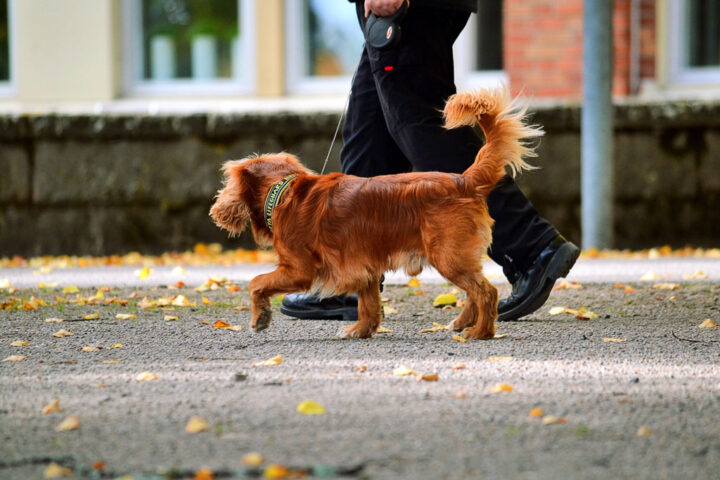The verb to walk in English usually translates as camminare in Italian. It derives from the noun cammino (walk, journey) which entered the language from the Latin camminus.

Learn with our video
Camminare is a regular-first conjugation verb finishing with -are, which means it conjugates in the following manner in the present tense:
io cammino
I walk
tu cammini
you walk (informal)
lui cammina
he walks
lei cammina
she walks
Lei cammina
you walk (formal)
noi camminiamo
we walk
voi camminate
you walk (plural)
loro camminano
they walk
Mi piace camminare per le vie di Torino.
I like walking the streets of Turin.
There are a number of ways in which people walk including:
- camminare adagio = to walk slowly
- camminare in fretta = to walk quickly
- camminare di buon passo = to walk at a good pace
- camminare mano nella mano = to walk hand in hand
- camminare in fila indiana = to walk single file
- camminare avanti e indietro = to walk back and forth
- camminare in tondo = to walk in circles

The exclamation Cammina! (Walk!), in addition to being the imperative form in the second-person singular, is also a slightly nicer way of saying Vattene! (Get lost!) or Sbrigati! (Hurry up!). If it is preceded by ma (but), it becomes an expression of disbelief.
Roberta è una spia, te lo giuro! – Ma cammina, dai…
Roberta is a spy, I’m telling you! – Oh, give me a break…
Note: When Italians talk about going on a walk, they don’t normally use the verb camminare. Instead, you’ll hear them use the expressions fare una passeggiata or andare a spasso for an easy walk close to home. For more strenuous walks, they might say fare una camminata.
To say they’re walking the dog, they’ll use portare il cane a spasso, portare il cane fuori (with fuori meaning out or outside), portare il cane a fare una passeggiata or the more “straight to the point” portare il cane a fare i bisogni / fare la pipì (lit. to take the dog to do its business / to pee).
Another common expression related to walking is andare a piedi which means to go on foot.

Occasionally, camminare can also be used as a masculine noun to mean walk(ing) or gait.
Il suo camminare avanti e indietro davanti alla casa ha insospettito i poliziotti.
The fact that he was walking back and forth in front of the house made the policemen suspicious.
More generally, camminare can refer, not just to people, but also to things that move from one place to another. For example, it wouldn’t sound at all strange to say il treno cammina sulle rotaie (lit: the train walks on the railway tracks) or la macchina cammina sulla strada (lit: the car walks on the road) in Italian.
It can also function as a synonym for funzionare (to work) when describing mechanical things or andare avanti (to move forward) when talking about projects or work.
Sono mesi che il mio orologio da polso non cammina più. Ormai uso solo il telefono per leggere l’ora.
It’s been months since my wristwatch stopped working. These days I only use my cellphone to tell the time.
In literary Italian, camminare can be transitive, which means that it may take a direct object (e.g. camminare il mondo = to walk the world).

Idiomatic expressions featuring ‘camminare’
Camminare a testa alta
Literal translation: To walk with a high head
English meaning: To walk with one’s head held high
Camminare sul sicuro
Literal translation: To walk on certainty
English meaning: To not take risks
Camminare sulle uova
Literal translation: To walk on eggs
English meaning: To proceed with great caution, to walk on eggshells
Sembrare un morto che cammina
Literal translation: To look like a dead man walking
English meaning: To look physically battered and bruised
Camminare con le proprie gambe
Literal translation: To walk with one’s own legs
English meaning: To stand on your own two feet
Camminare sul velluto
Literal translation: To walk on velvet
English meaning: To proceed without encountering great obstacles or difficulties
This article is also available in video format on our YouTube channel. The audio version can be found on Podbean, Google Podcast, Apple Podcast and Spotify.
Heather Broster is a graduate with honours in linguistics from the University of Western Ontario. She is an aspiring polyglot, proficient in English and Italian, as well as Japanese, Welsh, and French to varying degrees of fluency. Originally from Toronto, Heather has resided in various countries, notably Italy for a period of six years. Her primary focus lies in the fields of language acquisition, education, and bilingual instruction.


